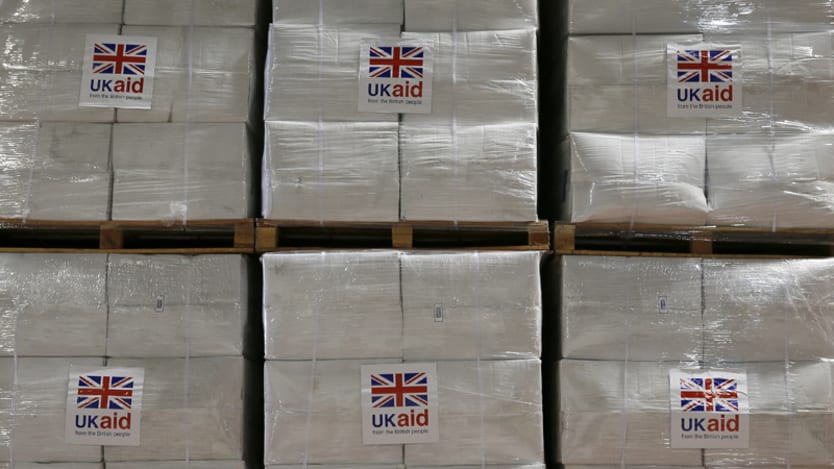
LONDON — Aid money spent outside the U.K. Department for International Development is failing to meet good standards on poverty focus, effectiveness, and transparency, a new report has found, as DFID’s share of the aid budget continues to fall.
“As the Treasury is deciding who gets what in this year’s spending review, they shouldn’t allocate any more aid to departments which don’t deliver ‘real aid.’”
— Romilly Greenhill, U.K. director, ONE CampaignAnalysis by the ONE Campaign comparing aid spending across Whitehall departments from 2016-2017 found significant discrepancies in how the money is being spent. It also found that although British aid is officially untied, at least £457 million ($595.8 million) was spent through programs that require United Kingdom institutions to be part of any bid.
The Foreign & Commonwealth Office and the Home Office scored worst in the Real Aid index, published Monday, which assesses poverty focus, transparency, and effectiveness in aid spending, while DFID scored highly across all three measures.
The ONE Campaign said it hopes it will influence the upcoming U.K. spending review, when HM Treasury will decide on each department’s budget and financial priorities for the next three to five years, including who spends how much official development assistance.
Romilly Greenhill, the ONE Campaign’s U.K. director, said: “The lion’s share of U.K. aid is poverty-focused, effective, and transparent … But some parts of government don’t adhere to these principles. As the Treasury is deciding who gets what in this year’s spending review, they shouldn’t allocate any more aid to departments which don’t deliver ‘real aid.’”
The index comes amid growing concerns among aid experts that the quality of U.K. aid is declining as more of the budget is spent outside DFID. Last year, DFID spent only 72 percent of the ODA budget and its share has dropped in recent years, in response to the 2015 cross-government aid strategy.
Recent comments by some politicians about a possible merger between DFID and FCO have also sparked alarm, alongside efforts from the international development secretary Penny Mordaunt to change the rules that govern how ODA is spent.
However, while some campaigners have said they would like to see more U.K. aid returned to DFID — and DFID Permanent Secretary Matthew Rycroft has said he will ask the treasury to ring-fence DFID’s funding — Greenhill said the ONE Campaign does not have “a strong position on who should spend aid, as long as it meets our standards on poverty focus, effectiveness, and transparency.”
She added that some aid programs run outside of DFID scored well, such as the International Climate Fund run by the Department for Business, Energy and Industrial Strategy, or BEIS, and the Department for Health and Social Care’s, or DHCS, work on disease outbreaks.
The new index is the latest in a string of similar initiatives which indicate that U.K. aid standards may be slipping. A report by the Center for Global Development in December suggested that the quality of U.K. aid fell sharply between 2012-2016, but did not disaggregate the data by government department. Last year’s Aid Transparency index also placed FCO among the least transparent donors globally, while DFID ranked near the top.
ONE’s index is the first to compare aid quality by individual department. The campaign awarded each department a green, amber or red rating based on their performance in each category. While DFID scored green for all three measures, the Home Office scored red across the board. FCO received a red score for its poverty focus and amber for effectiveness and transparency. BEIS and DHSC had a mixed performance.
The index also found that only 5 percent of the £765 million spent by BEIS last year, and only 16 percent of the £1.05 billion spent by FCO, went to least developed countries and fragile states. The Home Office spent most of its £352 million ODA allocation in 2017 on resettling refugees in the U.K. rather than supporting lower-income countries.
The report also found evidence that some U.K. aid — at least £475 million — is still tied despite a prohibition under the International Development Act. The Global Challenges Research Fund, which sits under BEIS, requires initial applicants to be from U.K. research institutions.
The Newton Fund, which promotes economic development and social welfare in partner countries, also requires applicants to collaborate with, or be supervised by a U.K. university. Even when programs are not tied, a disproportionately high number of contracts, including from DFID, are being awarded to U.K. companies and NGOs, the report states.
More reading:
► UK plummets in aid quality ranking
► UK foreign office among least transparent aid donors globally, study finds
“While U.K. organizations may naturally have some advantages when bidding for contracts … we would not expect them to win such a large share of contracts under a fully open contracting process,” the report states.
The ONE Campaign estimates that £1.5 billion of U.K. aid was spent with little transparency, and only two out of the five aid-spending departments met the standards set by the International Aid Transparency Initiative. For example, the Home Office has not published anything on the cross-government DevTracker website, which lists data about U.K. aid projects, in the last five years, the report states.
The government has previously defended its strategy of spending aid through other departments, saying that “U.K. aid spending is best done using expertise across government,” and that “we must ensure ... standards are raised ... to achieve value for taxpayers’ money.”
Search for articles
Most Read
- 1
- 2
- 3
- 4
- 5








